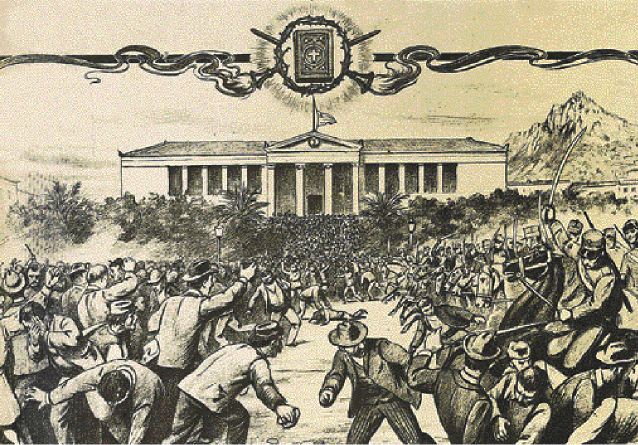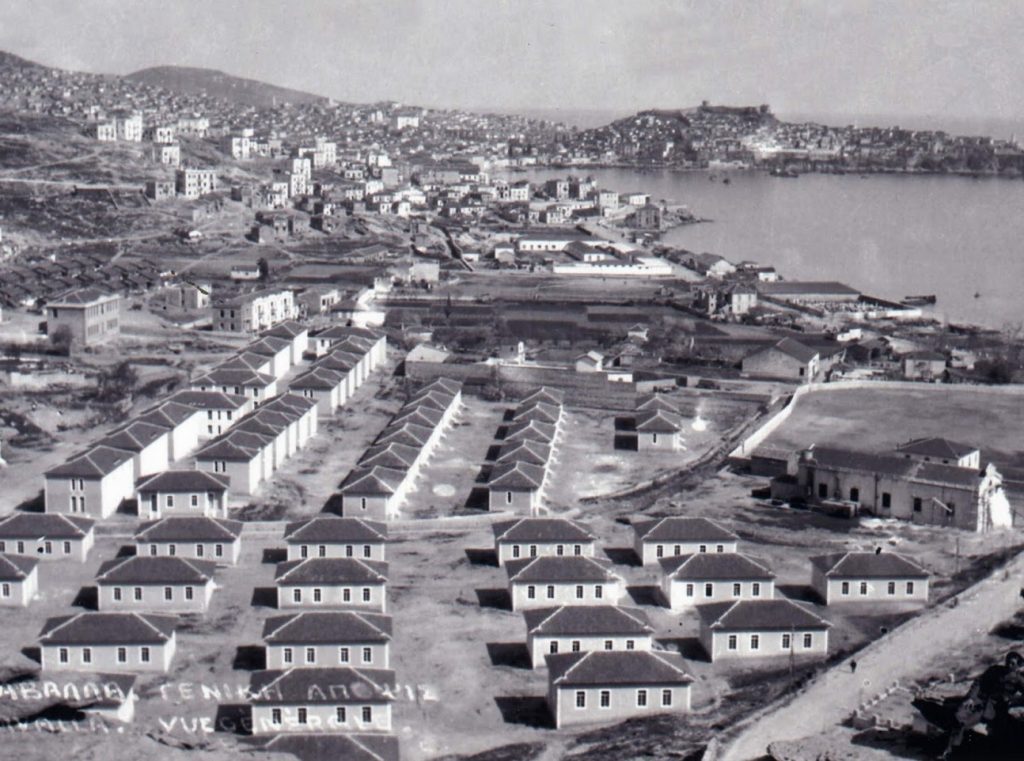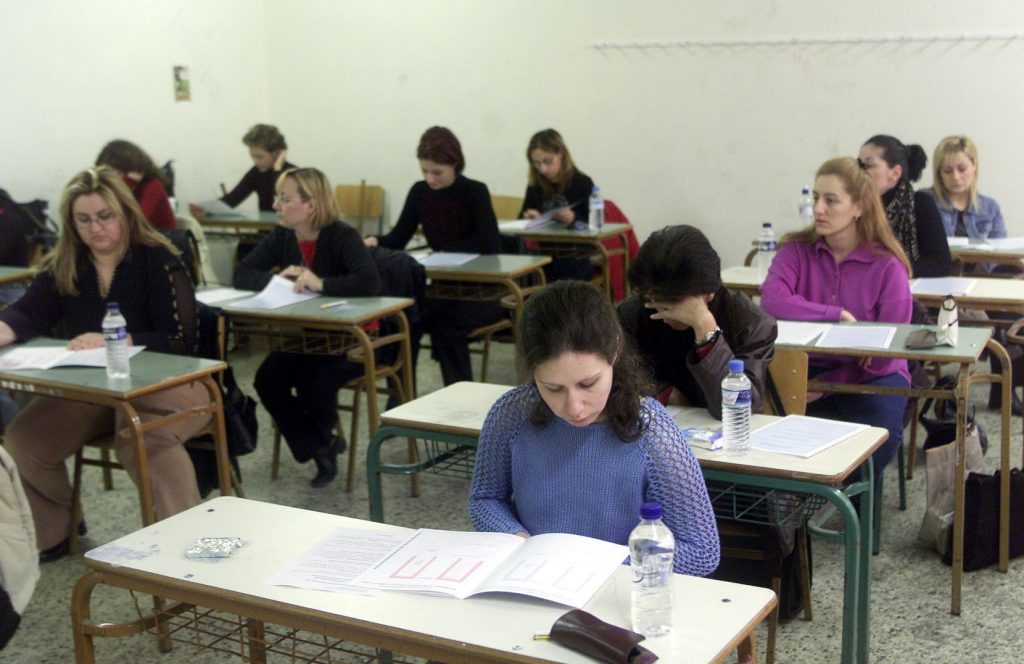Thodoris Georgakopoulos is a writer, a journalist and the editorial director of the Dianeosis think tank. He recently edited the collective volume published by Dianeosis, titled “10 reforms that changed Greece” [link in Greek]. The book presents and analyzes ten important – but very different from each other – reforms that have been introduced in the Greek political system during the last 200 years.
The reforms and the writers that narrate their history are the following:
- Constitutionalist Xenophon Kontiadis writes about the Constitution of Troezen that passed in 1827 after an episodic process and, although it was never implemented, laid the foundations on which the Hellenic Republic operates until today.
- Legal practitioner and historian Lydia Tricha writes about “principle of declared confidence” [dedilomeni], perhaps the most important principle of our parliamentary regime, established in 1875.
- Historian Katerina Gardika writes about the fight against malaria, and specifically about an important intervention that began in 1905 and did not come from the state or some foreign agent, but from what we now call “civil society”.
- Constitutionalist Spyros Vlachopoulos writes about the constitutional guarantee of the tenure of civil servants which, after many adventures, passed in 1911.
- Economic historian Ioanna Sappho Pepelasi writes about the law instituting the “Société Anonyme” (S.A.) type of coorparation, which, also after many decades of efforts, passed in 1920.
- Political scientist Dimitris P. Sotiropoulos writes about the reception and intergration of hundreds of thousands of refugees who came to Greece in the 1920s, mainly after the Asia Minor Catastrophe.
- Geographer Thomas Maloutas writes about the Antiparochi, a law that helped significantly in meeting the housing needs of cities at a time when they were growing rapidly.
- Historian Evanthis Hadjivassiliou writes about the establishment of rural clinics, which changed the living conditions in the Greek province forever.
- Linguist Maro Kakridi-Ferrari writes about the introduction of the Demotiki, the colloquial vernacular, as the official language of the state in 1976.
- Political scientist Kalliopi Spanou writes about the foundation of ASEP, the Supreme Council for Civil Personnel Selection in 1994.
Thodoris Georgakopoulos spoke to Rethinking Greece* on the criteria for selecting these 10 reforms presented in the book, the fact that the modern Greek state has instituted a significant number of important reforms, the importance of civil society as exemplified in reforms like the fight against malaria in the beginning of the 20th century and the establishment of the Demotiki as an official language in 1976; the success of the integration of one million refugees from Asia Minor in 1922 and finally on how Greece can achieve great results when it coordinates its resources and works on a clearly defined project. He concludes that in all democratic societies, solutions are almost always late and messy and that, contrary to popular belief, they are not brought about single-handedly by inspired politicians; the clear or implied support of the majority is a necessary precondition for any signifcant reform to pass.
In the introduction of the book “10 reforms that changed Greece” you mention that what you were more interested in was not to evaluate or record these reforms, but to explore their “political history. Can you tell us more on that? What were the criteria for selecting these specific reforms were selected?
What was important for us was to see if we could establish patterns and arrive to conclusions about reforms in Greece in general. All those reforms were important; they changed something fundamental in the country. That meant that all of these reforms were difficult to pass, and that’s exactly what we wanted to explore. How are reforms introduced in the Greek political system? Who are the main players that usually succeed in passing reforms? What were the difficulties? What are the common threads between these difficulties and how they were surmounted by the political forces of each era?
A second criterion was that the reforms included in the book were all implemented during democratic periods of our nation’s political history. We did not include reforms that happened during Otto’s reign, for example, or during the dictatorship, or during other periods of our history when we didn’t have a steady democratic regime in place. Sometimes the democracy conditions were not ideal, but there was at least a minimum of public participation in what was happening in the political system. Despite the turbulent history of modern Greece, there are actually large parts of our political history that could be described as democratic. The reforms that we selected for book are all located within those periods. And a third criterion was that there was an interesting political story behind each reform. We wanted to make the book vivid easy to understand and to extract conclusions from. They weren’t strict criteria, in the sense that there are so many reforms that could fit into them.
Once we arrived at a preliminary list of reforms of that kind, we matched reforms with the experts who knew the political history of these reforms very well. And it was quite easy to find ten reforms of this kind to include in this book, we could select 20, and it would still be easy. Contrary to what many people believe, a lot of very important reforms have been introduced by the Greek political system in the past 200 years.

The book emphasizes that – contrary to popular belief – these reforms were not the result of the vision of an enlightened person, but of the mobilization of civil society. Can you give us a couple of examples of such reforms?
Well, civil society did not participate in all these reforms per se. What happened was that there was a need and an expressed desire of the general public for these reforms to pass, for all of them. For example, everyone wanted malaria to be cured. Everyone desired a more equitable and more meritocratic public sector. In a couple of cases, the participation of civil society, what we call civil society today, was crucial. One prime example of this is how Greek society managed to deal with malaria, which had been a huge problem for decades. For centuries, actually, Greece was one of the most afflicted places in the world; death rates from malaria were similar to those of African nations. At one point, Greece was consuming a fifth of a global Quinine production, which was the only antimalarial drug that was available at the time. Many governments and state organizations, as well as philanthropic organizations had been trying to deal with this issue. The definitive solution would not arrive until the second half of the 20th century, when technological solutions as well as funds and expertise from international philanthropic organizations were available.
But to arrive at that point, there were a few crucial conditions that needed to be at place first. As we explain in the book, what happened was the foundation, in 1905, of the Greek Anti-Malaria League, which was we could call today a civil society organization. The organization did something very important that hadn’t been done before: they gathered data from different areas of the country with cases of malaria, as well as death rates, they created maps that traced and followed the evolution of the disease in the actual population, as well as an infrastructure of gathering data by local doctors. This gave them for the first time an actual image of what malaria was doing to the Greek population and of the scope of the problem. At the time this data was invaluable and very difficult to gather and organize; Greek didn’t even have a Ministry of Health. These complete date sets were vital to the international philanthropic organizations that came later, as they had the necessary information to work with.
Another example in which the civil society played a major part was the issue of the official state language in Greece. Many people don’t remember it, but we used to have a dual language system. There was one dialect of the Greek language, the Katharevousa, which was the official language of the state and the preferred language of the elites; and there was another dialect, the regular Dimotiki, which was what the vast majority of the population was using to communicate on a daily basis. For the majority of the existence of the Greek State – the past 200 years- this official language, the Katharevousa was the language of the academics, the politicians, the language that educated individuals wrote in and expressed themselves in, especially in official settings.
Katharevousa was also the language that was taught in schools. Students had to learn it, despite the fact that back home, almost everyone was exclusively speaking in the Demotiki dialect. That was an issue that had become a major arena for ideological and political battles throughout the history of the Greek state. There were very active social groups that were defending the one or the other dialect. Today that may sound very strange, but it was a very serious issue that troubled Greece for decades; it had led to major riots in Athens, brutal confrontations, and even deaths. The mobilization of the organizations that were supporting the universal use of the Demotiki language across all aspects of life in Greece was extremely vital to reaching a solution; finally Demotiki was adopted as the official language of the Greek state in 1976.

In the last two years Greece – along with the rest of the world – had to face the great health crisis of Covid 19. What are the lessons we can learn from the way in which the Greek state handled emergencies such as the integration of 1,000,000 refugees from Asia Minor in 1922?
Beginning a few years ago and culminating a few years after the defeat of the Greek Army in the war of Asia Minor in 1922, over a million refugees came to Greece. And then an exchange of populations with Turkey was agreed, which created a major problem for the Greek state at the time, as the country needed to welcome, host and integrate a whole new population that amounted to almost 1/6 of the total population of the country at the time. This happened in a way that was mostly successful, which almost seems inconceivable, considering what the Greek state was capable of at the time. The major lesson we can glean from this time in Greek history is that even a not very mature state can come up with great results if it coordinates its limited resources and works on a clearly defined project.
In this particular case, the international element was important. There were international non-profit organizations that came to Greece, and there was also a state organization, the Refugee Rehabilitation Committee that was created to steer the entire effort. It was foreign-lead, but it was populated by Greek civil servants. And the actual work was done with what the Greek state had available at the time. The way these one million refugees from Asia Minor were integrated could be described as almost flawless. Of course, there were tragic cases among all those million refugees and their families. But as a whole, the fact that they could be led to specific places, given jobs and that we were able to build infrastructure to host them, was a great success. Buildings were erected, and even entire neighborhoods were built in cities like Kavala and elsewhere. At the same time, we were able to exploit opportunities of the era, like the fact that after the exchange of populations with Turkey, large populations of Muslims had left great areas of Greece; these areas were populated with the new refugees, which is pretty much what happened in Macedonia. There was an organizational direction from the international organization that came to Greece at the time, but it was the Greek state, working towards a common goal that was able to direct its own resources to solve a problem that seemed insurmountable at the time.

In an article for ‘Kathimerini’ newspaper you write that all the reforms had the support of large social groups, but in the end they all passed slowly, with difficulties and obstacles. What do you think were the reasons for these difficulties? Is this the case always with great reforms?
I think this is what happens in all Democratic societies. Whenever big reforms are needed, they are needed to solve an important problem. In states like the Greek state that has existed for 200 years, there are some entrenched interests that have adapted to a status quo and don’t want things to change. Usually these groups, which are almost always very vocal minorities, have a lot to lose from these reforms. Here we can look at the example the reform of ASEP, the creation of an independent body for the selection of civil servants in 1994. There were interests with political power that had a lot to lose if the selection of civil servants happened in a meritocratic and transparent system. In the meantime, the majorities that want the reform to pass have very little to lose or to gain on an individual basis. It is to the benefit of the whole of a society if civil servants are selected with a meritocratic and transparent system, but each and every one of us has very little to gain. That means that every single one of us has very little incentive to actually fight for such a reform, whereas people who benefit from a clientelistic system have a lot to lose if such a reform passes, so they have great incentive to fight against it.
Part of the political system also might have an entrenched opposition to pass this type of reforms because it has learned to live with the current system. But as it happens, and it’s apparent in most of these reforms included in the book, what the majority wants is very important; it provides a strong mandate to the political forces that do want to pass these reforms. That mandate is crucial. It’s essential. Within the political system, there have been healthy and sometimes vocal majorities –or civil society groups as we mentioned- that push the political system towards the end goal. They do not always succeed immediately. Sometimes it takes decades for conditions to mature. And when the reform actually does pass, it’s rarely clean or perfect. The reality is always messier than that. Even in the case of the ASEP reform, it actually did create a meritocratic and transparent system to select civil servants with, bu there were parts of the law that introduced this new system that were problematic. But the main thing is that the system survives. It actually still works almost 30 years later.
So the lesson that one can arrive to, is that democracy is always messy. Solutions are never clean, as problems are never clean cut, black and white. Solutions are almost always late and almost always messy. And they never, ever pass unless there is a clear or at least an implied mandate from a silent or not very silent majority. I think that’s the way democracy works all around the world. Popular mandate is crucial; people need to want the reforms in order for them to pass. The idea that some incredible politicians that have a strong will and the perfect instincts, are single-handedly able to pass these types of reforms, is a myth. It never, ever happens without the approval of the silent majority.
* Interview by: Ioulia Livaditi

TAGS: MODERN GREEK HISTORY | REFORMS















